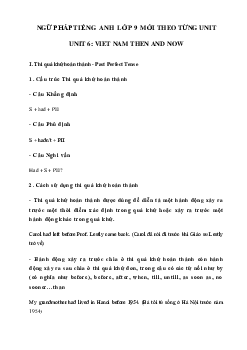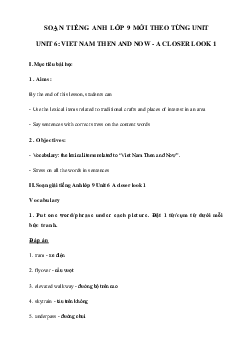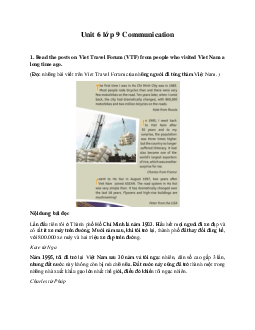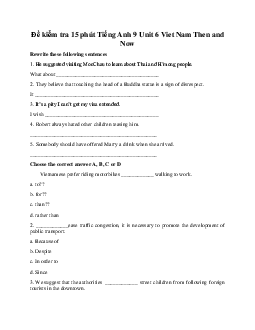





Preview text:
Unit 6 lớp 9 A Closer Look 2
1. Fill in each blank with the past perfect form of the verb in brackets.
(Điền mỗi chỗ trống một động từ ở dạng quá khứ hoàn thành) Gợi ý đáp án 1. had been 2. had played 3. had you used 4. had only seen 5. had had 6. had experienced
Lời giải chi tiết
1. Before the 1990s, trams had been a popular means of transport In Ha Noi.
(Trước những năm 1990, xe điện đã trở thành phương tiện phổ biến ở Hà Nội.)
2. I won the game because I had played It a lot with my brother.
(Tôi đã thắng trò chơi vì tôi đã chơi nó rất nhiều lần với anh tôi.)
3. How long had you used your mobile phone before it broke down?
(Bạn đã sử dụng điện thoại di động bao lâu rồi trước khi nó bị vỡ?)
4. Before the invention of television, people only had only seen films at the cinema.
(Trước khi phát minh ra truyền hình, người ta chỉ xem phim tại rạp chiếu phim.)
5. Before the 1990s, Viet Nam had had an old banking system.
(Trước những năm 90, Việt Nam đã có một hệ thống ngân hàng cũ.)
6. Viet Nam had experienced decades of fighting for freedom before the country became totally independent.
(Việt Nam đã trải qua hàng thập kỷ tranh đấu cho tự do trước khi đất nước hoàn toàn độc lập.)
2. Ask and answer the following questions using the cues.
(Hỏi và trả lời những câu hỏi sau có sử dụng gợi ý. ) Gợi ý đáp án
1. What family groups had Vietnamese people lived in before 1990?
- They had lived in extended families
2. How had people in Vietnam travelled before the first motorbike was imported?
- They had travelled by bicycle
3. How had Vietnamese people lived before the open-door policy in 1986? - They had had a harder life
4. Where had your family spent holidays before 2005?
-We had spent our holidays only in Vietnam before then
5. Who had ruled Vietnam right before the Tran dynasty?
- Ly Chieu Hoang had ruled the country beofore the Tran dynasty
3. Match the first half of the sentence in A with the second half in B.
(Nối một nửa của câu ở mục A với một nửa của câu ở mục B) Gợi ý đáp án 1. F 2. A 3. B 4. E 5. D 6. C
4. Fill in each blank with one adjective from the box. More than one adjective can be used.
(Điền vào mỗi chỗ trống 1 tính từ trong bảng. Nhiều hơn 1 tính từ được chấp nhận) Gợi ý đáp án 1. glad/ pleased 2. sorry 3. relieved/ sorry/ pleased 4. sure/ certain 5. surprised/ astonished 6. relieved/ pleased
5. Create one sentence by combining each pair of sentences using subject + be + adjective + that-clause.
(Viết câu bằng cách kết hợp 2 câu sử dụng cấu trúc S+ be+ tính từ+ that+ mệnh đề.) Gợi ý đáp án
1. We were relieved that we had done well in the exam.
2. I am sorry that our parents had very poor school facilities.
3. Everyone was glad that the government had decided to invest more in education.
4. Everyone is aware that it will be much safer to have elevated walkways and underpass systems for pedestrians
5. All of us are delighted that life in the countryside has improved considerably.
6. Finish the following sentences using your own ideas. Then compare your ideas with a partner.
(Hoàn thành các câu sau sử dụng ý tưởng của bạn. Sau đó so sánh với bạn cặp của mình. ) Gợi ý đáp án
1. It was kind of them to support the victims after the disaster.
(Họ thật tốt bụng khi hỗ trợ các nạn nhân sau thiên tai.)
2. They were certain to be able to build the country into a powerful one.
(Họ chắc chắn có thể xây dựng đất nước thành một cường quốc.)
3. She is confident that Viet Nam has good potential for tourism.
(Cô ấy tin tưởng rằng Việt Nam có tiềm năng du lịch tốt.)
4. He was afraid that there would be less land for agriculture in Viet Nam.
(Anh ấy sợ rằng sẽ ngày càng ít đất nông nghiệp ở Việt Nam.)
5. The teachers are aware that non-academic subjects are also significant.
(Các giáo viên nhận thức được rằng các môn học phi học thuật cũng quan trọng.)
6. The head teacher was astonished to learn that some of his students could not get scholarships.
(Giáo viên chủ nhiệm đã kinh ngạc khi biết rằng một số học sinh của anh ấy không thể có được học bổng.)



